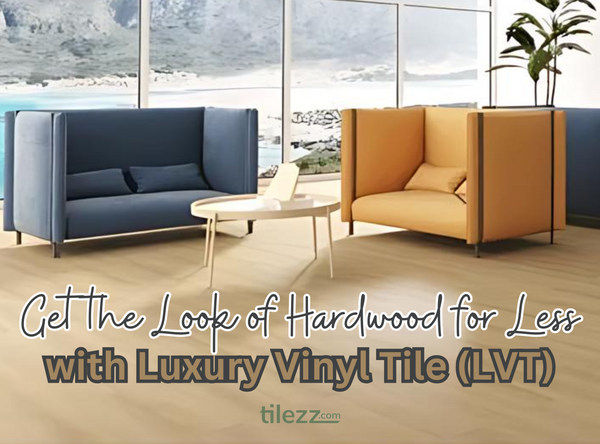
Get The Look: Powell Ell Weath 7x48 Luxury Vinyl Plank
Not sure if you want to invest in hardwood flooring or choose a less expensive lookalike? In this blog post, we’ll discuss the differences between hardwood and luxury vinyl tile (LVT) to help you make an informed decision for your home renovation project.
What Is LVT?
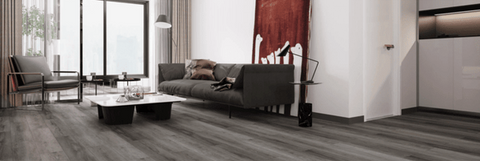
Get The Look: Iris Smoke 7x48 SPC Luxury Vinyl Plank
Luxury vinyl tile is made from PVC, a sturdy type of plastic. It features a print film that mimics the look of various materials, such as hardwood and natural stone. With LVT, you can get the look of expensive tile materials for less with the added benefits of luxury vinyl tile.
LVT Vs. Hardwood: Pros and Cons
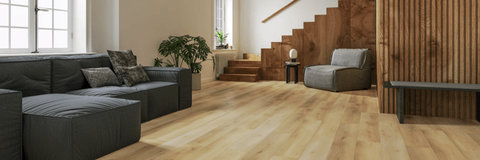
Get The Look: Fume Honey 7x48 SPC Luxury Vinyl Plank
A recent poll by Houzz found that engineered flooring, which includes options like LVT, laminate, and engineered wood, is almost twice as popular as natural hardwood among homeowners renovating their kitchens. Engineered flooring was chosen by 40% of poll participants, while only 24% selected hardwood for their projects.
As a brief overview, both luxury vinyl tile and hardwood are available in a wide range of styles and designs, although LVT planks are usually shorter than natural hardwood planks.
When it comes to cost, hardwood is more expensive and can add more value to your home. Both options are durable and exceptional choices for a variety of applications. However, LVT is a better choice for areas that are prone to moisture.
Appearance
No matter the type of wood you’re looking for, you can find both LVT and wood planks that match your desired appearance.
LVT can accurately imitate the look of many types of hardwood, but one of the main differences in appearance is that it usually comes in shorter planks, with most luxury vinyl tile planks measuring four feet long. Natural hardwood, on the other hand, comes in planks of up to seven feet for a slightly different look. It also has varying grain patterns and knots.
While LVT can mimic these natural features, they won’t be quite as “random” as they would be with real hardwood. However, pulling LVT planks from different boxes during installation can counteract this potential concern.
Water Resistance
When installed properly, luxury vinyl tile is waterproof, meaning that it won’t be damaged by humidity or moisture. This can make it a fantastic choice for applications like below-grade basements, bathrooms, laundry rooms, and kitchens.
Hardwood, on the other hand, naturally absorbs liquids and is prone to stains. It can also grow mold and mildew due to moisture. While sealing your hardwood floor can help, it doesn’t make it completely waterproof.
Durability
Some types of natural hardwood are beautiful but too soft to stand up to regular wear and tear. Bamboo, for example, looks gorgeous but isn’t durable enough for commercial applications. This is where LVT with a bamboo appearance would be a much better choice. You could also select a harder type of wood for high-traffic areas.
Most LVT manufacturers offer a 10- to 20-year warranty, after which it’s possible the protective coating of the tile may wear down. Meanwhile, hardwood can last for many years if it’s properly maintained. Refinishing and resealing hardwood can extend its lifespan.
Installation
Those who are determined to DIY their new flooring should choose luxury vinyl tile, as the installation process is simple and doesn’t require a professional (although you can hire pros to install LVT if that’s what you prefer). Most LVT either clicks together, has a peel-and-stick backing layer, or is glued to the floor.
Only advanced DIYers should attempt to complete their own hardwood installation, although some types of wood may be easier to install than others. It’s usually best to hire professionals to install natural hardwood.
Maintenance
If you want your hardwood floor to continue looking brand-new, it’ll need to be refinished every few years or so, which does require an additional investment aside from the initial cost of materials and professional installation. If you’re not looking for flooring that requires regular maintenance, you’ll likely be better off choosing luxury vinyl tile.
Resale Advantages
Those who are selecting their flooring material based purely on the value it can add to their home may be better off with natural hardwood. If you’re looking to sell your home, and similar houses in the area have LVT flooring, a new hardwood floor may set yours apart from the competition.
Hardwood has a longer lifespan (although it does require more maintenance) and has a certain texture and warmth that isn’t necessarily replicated by LVT. It can come with a higher ROI in some cases.
LVT comes with some resale advantages as well: It’s quieter than hardwood, with better soundproofing qualities, for instance. It’s also softer and more comfortable underfoot.
Luxury vinyl tile is stylish, durable, easy to clean, and resistant to scratches and spills, which makes it an excellent choice for homeowners with children and pets.
Environmental Impact
Hardwood is made from trees, a renewable resource, but if you’re looking to make the most sustainable flooring choice possible, it can be important to ensure the manufacturer you buy from is environmentally responsible. Many of today’s manufacturers are fighting deforestation, with some having their own company-run tree farms where the resources are constantly replenished.
Hardwood can be recycled, and it’s biodegradable. If you choose engineered hardwood over natural hardwood, nearly all the parts of trees are used, including leftover materials and recycled wood scraps.
Luxury vinyl tile is often manufactured from petroleum, which is a non-renewable resource, and the manufacturing process often consumes a lot of energy and can produce toxic byproducts. When it’s first installed, some LVT off-gasses VOCs (volatile organic compounds).
However, this isn’t the case for all LVT, so you may want to do further research into the manufacturer you buy from. Some manufacturers practice various sustainability efforts and use recycled materials to produce recyclable tiles. There are even some companies that use abundant resources like salt instead of petroleum to create synthetic PVC.
Applications
Luxury vinyl tile and hardwood can be used in many of the same applications, including single-family houses, apartment buildings, healthcare sites, hospitality settings, retail stores, and corporate locations.
In general, hardwood should be avoided in areas with moisture, like restaurant kitchens, bathrooms, and laundry rooms, whereas LVT is a great choice for these areas (and even for applications like grocery store produce departments) because it’s waterproof.
Cost Comparison
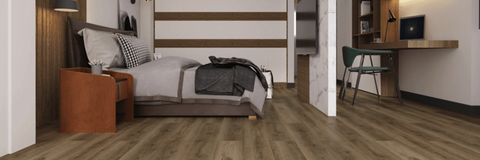
Get The Look: Powell Ell Driftwood 7x48 Luxury Vinyl Plank
In general, hardwood is more expensive than luxury vinyl tile. The material costs more, it usually needs to be installed professionally, and it must be refinished every few years to continue looking its best.
When making your decision, be sure to consider installation and maintenance costs as well as the cost of materials.
Estimates vary, but Forbes notes that LVT ranges from $2 to $9 per square foot for both materials and labor, whereas hardwood usually costs $6 to $12 per square foot. Vinyl installation costs an average of $2300, while hardwood installation averages $4200.
Homeguide estimates that luxury vinyl tile costs between $4 and $6 per square foot for materials and installation, while engineered hardwood ranges from $7 to $20 and natural hardwood $11 to $25.
Our Favorite LVT Options
Tilezz.com now has a range of luxury vinyl tile options to choose from! Check out a few of our favorites below.
The Powell Collection
The Powell Collection features six glue-down luxury vinyl tile options in the colors Ridge, Oregon (pictured below), Driftwood, Silver, Weath, and Oak. These tiles are meant for floor use only.
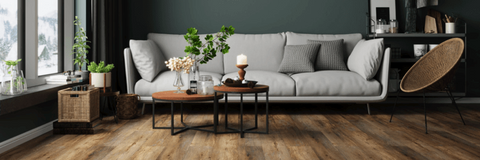
The Iris Collection
The Iris Collection contains nine LVT options in the shades Smoke, Oil, Bleached, Maple, Off White, Oak (pictured below), Blonde, Almond, and Walnut. These tiles can be used for both floor and wall applications.
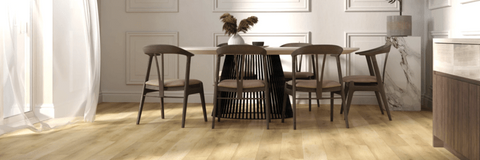
Each tile from the Iris Collection costs $3.49 per square foot and $83.41 per box, which contains 10 planks and covers 23.9 square feet.
Each luxury vinyl tile plank measures 7” by 48”. The Iris Collection combines beauty with functionality to add a sense of luxury to your home.
The Fume Collection
The Fume Collection includes six LVT options in the shades Tobacco (pictured below), Canela, Honey, Cotton, Silk, and Maple. These tiles are suitable for floor use only.
 Each costs $2.99 per square foot and $85.75 per box, which contains 12 planks and covers 28.68 square feet.
Each costs $2.99 per square foot and $85.75 per box, which contains 12 planks and covers 28.68 square feet.Planks measure 7” by 48”. With its range of realistic wood finishes that are waterproof and resistant to scratches and stains, the Fume Collection is perfect for adding elegance and style to your home.
Find the Perfect Tile for Your Home

Get The Look: Fume Canela 7x48 SPC Luxury Vinyl Plank
Tilezz.com is your one-stop shop for tile flooring. We have a wide range of natural stone, porcelain, ceramic, glass, and luxury vinyl tiles to suit a variety of preferences and styles. Plus, we make it simple to shop for tile online with fast delivery, insured shipments, and easy returns.
Take a look at our entire product line here, or visit our blog for informational articles and DIY installation guides. You can also join us on Pinterest for lots of interior design inspiration!